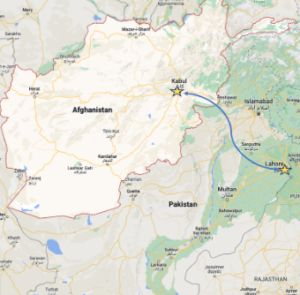Press Release
‘Hope Without Boundaries’ as Sheba Doctors Save Eyesight’s of Children from Afghanistan: Retinoblastoma Silk Road Program – Afghanistan to Pakistan
Retinoblastoma (Rb), a potentially deadly malignancy, is the most common eye cancer in children. While in high-income countries Rb is practically curable, in many regions across the globe, especially in low- and middle-income countries, barriers to healthcare cause survival rates to plummet below 50%. Rb is recognized by the World Health Organization (WHO) as one of the six index cancers of the Global Initiative for Childhood Cancer (GICC), which strives to achieve at least a 60% survival rate by 2030.

Afghanistan, a low-income country in Central Asia under Taliban control since 2021, witnesses nearly 100 new cases of Rb every year, yet lacks established treatment centers for this fatal disease. Many of these children seek medical aid at one of the National Organization for Ophthalmic Rehabilitation (NOOR) centers across the country, operated by the Afghani International Assistance Mission (IAM). However, these facilities lack appropriate treatment modalities for Rb, and therefore, these children are returned home without receiving necessary care.
The Retinoblastoma Silk Road Program was formed through collaboration between colleagues from Sheba Medical Center– Prof. Ido Didi Fabian, Dr. Mattan Arazi and Dr. Jonathan Kfir, Afghani NOOR/IAM, and Pakistani Rb Centers of Excellence in Lahore and Karachi, supported financially and logistically by Sheba Global, the international division at Sheba Medical Center. The program’s main objective is to establish an official referral pathway for Afghani children with suspected Rb to receive specialized treatment at designated centers in Pakistan.
“Through international collaboration, tele-medicine consultation, geographic coordination and charitable contributions, the Retinoblastoma Silk Road Program aims to significantly reduce child mortality rates caused by this fatal cancer. This joint endeavor aligns with WHO (World Health Organization) goals, and aims to become a model referral pathway for other countries, especially in underserved nations and communities,” said Prof. Fabian.
A video showcasing this program is attached.
About Sheba medical Center
The largest and most comprehensive medical center in the Middle East, Sheba Medical Center, Tel Hashomer is generating global impact through its medical care, research and healthcare transformation. Sheba’s City of Health boasts an acute-care hospital, rehabilitation hospital, research and innovation hubs, medical simulation center and center for disaster response on one comprehensive campus in the center of Israel. A university teaching hospital affiliated with the Sackler School of Medicine at Tel-Aviv University, Sheba is shaping the future of healthcare, educating the next generation of care providers. Sheba serves as a true hospital without borders, welcoming patients and healthcare professionals from all over the world and consistently providing the highest-level medical care to all in need. Sheba has been ranked a top-ten hospital in the world by Newsweek four years in a row (2019, 2020, 2021, 2022).

